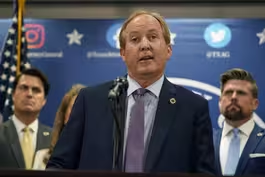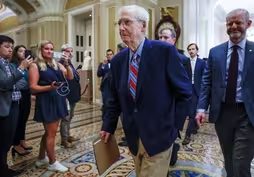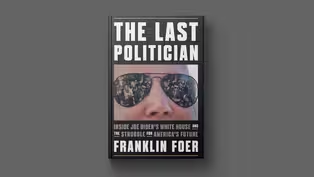
Questions remain as Saudi Arabia, Israel seek normalization
Clip: 9/5/2023 | 12m 4sVideo has Closed Captions
How normalized relations between Saudi Arabia and Israel could change the Middle East
Israel and Saudi Arabia have never had diplomatic relations. But both countries’ leaders appear to want normalization, and the U.S. is actively negotiating its details. It would create a tectonic shift in the Middle East, but critics argue it could come at too high a price for not enough gain. Nick Schifrin discussed the possible deal with Robert Satloff, Bernard Haykel and Dalia Dassa Kaye.
Problems playing video? | Closed Captioning Feedback
Problems playing video? | Closed Captioning Feedback
Major corporate funding for the PBS News Hour is provided by BDO, BNSF, Consumer Cellular, American Cruise Lines, and Raymond James. Funding for the PBS NewsHour Weekend is provided by...

Questions remain as Saudi Arabia, Israel seek normalization
Clip: 9/5/2023 | 12m 4sVideo has Closed Captions
Israel and Saudi Arabia have never had diplomatic relations. But both countries’ leaders appear to want normalization, and the U.S. is actively negotiating its details. It would create a tectonic shift in the Middle East, but critics argue it could come at too high a price for not enough gain. Nick Schifrin discussed the possible deal with Robert Satloff, Bernard Haykel and Dalia Dassa Kaye.
Problems playing video? | Closed Captioning Feedback
How to Watch PBS News Hour
PBS News Hour is available to stream on pbs.org and the free PBS App, available on iPhone, Apple TV, Android TV, Android smartphones, Amazon Fire TV, Amazon Fire Tablet, Roku, Samsung Smart TV, and Vizio.
Providing Support for PBS.org
Learn Moreabout PBS online sponsorshipAMNA NAWAZ: Today, America's top diplomat called Israel's prime minister and the president of the Palestinian Authority.
And senior U.S. officials met their counterparts in Saudi Arabia.
Among the topics of focus, could two of America's closest allies in the Middle East, Israel and Saudi Arabia, normalize relations?
Nick Schifrin examines the outline of a possible deal and its implications.
NICK SCHIFRIN: It would be a grand bargain and create a tectonic shift in the Middle East.
Israel and Saudi Arabia have never had diplomatic relations, but, today, both countries' leaders appear to want normalization, and the U.S. is actively negotiating its details.
The broad outline would be this: The U.S. provides Saudi Arabia security guarantees, civil nuclear technology with enrichment and advanced weapons, and Israel provides what officials describe as -- quote -- "meaningful concessions" to the Palestinians.
Here's how National Security Adviser Jake Sullivan described the possible deal late last month.
JAKE SULLIVAN, U.S. National Security Adviser: Peace between Saudi Arabia and Israel would be a big deal.
It would help create a circumstance in which the countries of the region could collaborate on everything from economics to technology to regional security.
And that would benefit the United States of America in a fundamental way, because we have an interest in a more integrated, more stable Middle East, where de-escalation, as opposed to escalation, is the order of the day.
NICK SCHIFRIN: But critics have argued it could come at too high a price for not enough gain.
To examine a possible deal and its implications, we get three views.
Robert Satloff is the executive director of the Washington Institute for Near East Policy.
Bernard Haykel is the professor of Near Eastern Studies at Princeton University.
And Dalia Dassa Kaye is a senior fellow at the UCLA Burkle Center for International Relations.
Thank you very much.
Welcome to all three.
Bernard Haykel, let me begin with you.
Why is this important for Riyadh?
And, as you understand it, what are their most important asks?
BERNARD HAYKEL, Princeton University: So, it's extremely important for Riyadh, because they would like to get certain guarantees from the United States.
There's a fourth, by the way, or fifth issue that they would like, which is a free trade agreement with the United States, in addition to the ones you have already listed.
And I think they are interested in stability and they want to move away from the ideologies of anti-imperialism and resistance to the U.S. and turmoil which has characterized much of the history of the modern Middle East until recently.
And so it's very important for Riyadh to normalized with Israel, but under certain conditions.
NICK SCHIFRIN: Robert Satloff, security guarantees from the U.S., advanced weapons from the U.S. civil nuclear program with enrichment.
Are these things that Prime Minister Netanyahu in Israel and President Biden are willing to give Saudi Arabia?
ROBERT SATLOFF, Executive Director, Washington Institute for Near East Policy: Well, Nick, so far, it looks like President Biden wants to go big.
He doesn't want to nickel-and-dime on what each side is asking the other.
He's trying to make a big deal, that each side makes big concessions to each other.
As for the Israelis, there's an internal debate we're seeing within the national security establishment in Israel on what types of guarantees and benefits to the Saudis might have a negative impact on Israel's qualitative military edge.
But, right now, it seems as though Israel's political and security leaders are leaning toward accepting the big deal outlines of security guarantees and even a civil nuclear relationship between the United States and Saudi Arabia.
NICK SCHIFRIN: Dalia Dassa Kaye, you recently argued that this deal would not genuinely advance peace in the Middle East; in fact, it could make things worse.
Why?
DALIA DASSA KAYE, University of California, Los Angeles: Well, look, normalization is, of course, positive, and the U.S. should welcome it.
But as the piece setup suggested, it will be a high price and mostly paid from Washington.
So this defense pact that we're talking about with the Saudis is the kind of agreement we don't even have with Israel.
We tend not to have these agreements with undemocratic partners, particularly those with erratic records, foreign interventions.
The nuclear agreement on the table seems to go beyond the type of cooperation we have with other regional partners.
So, I think it's quite a high price, and there's a lot of wishful thinking about the kind of gains that it could potentially bring.
NICK SCHIFRIN: And staying with you, Dalia Dassa Kaye, are there also concerns, given human rights concerns, about Saudi Arabia and its leader, Mohammed bin Salman?
And there's also concerns by critics in Israel that certain steps that government is taking would erode the checks and balances.
DALIA DASSA KAYE: Well, there's always concern about the Saudi domestic record on human rights and continued repression, transnational repression against dissidents and so forth.
This will be a particularly big issue if this comes to Congress.
If this is a formal defense pact, it will require congressional ratification.
There also is concern in some quarters that this could be -- the timing is quite awkward, because it could potentially bolster the Israeli prime minister when he is launching this assault on the independent judiciary in the country, when you have unprecedented protests for 35 weeks.
So, that is another concern that comes up with the timing of this particular agreement.
NICK SCHIFRIN: Bernard Haykel, address some of those arguments about concerns about the promises to Saudi Arabia when it would come to especially enrichment, and to what Dalia Dassa Kaye referred to as the repression of the kingdom.
BERNARD HAYKEL: De facto, the United States has come to the defense of Saudi Arabia when it was threatened in 1990 by an Iraqi invasion.
So, I think that, in fact, the United States would come to Saudi Arabia's defense simply for geopolitical reasons and because of the oil reserves that are in that country and neighboring countries.
On human rights, absolutely, the Saudis don't have a good record.
They have a pretty bad record.
And that is something that the United States has raised in the past and should continue to raise.
I don't see how, though, a purely value - - values-based foreign policy is going to advance peace in the Middle East or, for that matter, make the Saudis behave better.
If you link the Saudis to a normalization agreement with Israel, I think you have a better chance of gaining leverage on that and many other files.
And, finally, on the nuclear agreement, the Saudi position is, the United States has effectively agreed to the Iranians being allowed to enrich, so why shouldn't they be allowed to enrich?
NICK SCHIFRIN: And, Robert Satloff, can you respond to the concerns that Dalia Dassa Kaye raised about the Israeli government that are, frankly, being raised across Israel every night through unprecedented domestic protests?
ROBERT SATLOFF: Well, I think the answer here is very simple, that you can't choose when moments of opportunity emerge.
And I think we do a little bit of disservice to the negotiations to only call this a normalization agreement.
I think what the Biden administration has in mind is something much more transformative, which is, yes, at its core, making a normal, peaceful relationship between our closest Middle East ally and perhaps the most important Arab and Muslim states, Saudi Arabia.
But it's even bigger than that.
It has to do with deterrence against regional threats headed by Iran, and it has to do with getting our partners on the same side with us in terms of the military security and the high technology approach vis-a-vis China.
NICK SCHIFRIN: Dalia Dassa Kaye, are your concerns assuaged perhaps, if this is a truly transformative deal, as Robert Satloff just said?
DALIA DASSA KAYE: What I am questioning is what gains we will get on the strategic level.
When it comes to China, this notion that this agreement can kind of help move the Saudis back into the U.S. camp, move it further from the Chinese orbit, it's just not in touch with the regional realities today, that countries like Saudi Arabia and others, other partners in the region, don't want to take sides.
They are playing all sides, and they're playing them well.
When it comes to Iran, we're not going to have some unified pro-American axis confronting the Iranians, as much as we might like it.
The Saudis themselves are normalizing and resuming relationships, diplomatic relations, with Iran as we speak.
And then, finally, when it comes to these expectations of big wins on the Palestinian front, what Israeli government are we talking about?
We are 30 years from Oslo, and we are as far as we ever have been from a two-state solution.
We have time.
Let's get a good agreement if we're going to normalize and let's make sure the U.S. isn't paying an unnecessarily high price.
NICK SCHIFRIN: Bernard Haykel, let's zoom into the Palestinians and their request right now.
When the United Arab Emirates normalized with Israel, they agreed with the Trump administration and the Israeli government that the Israeli government would not pursue annexation for a number of years.
Will the Saudis ask for even more than that?
And, in general, how important are the Palestinian requests to this overall conversation for the Saudis?
BERNARD HAYKEL: So, I think the Saudis will ask for a certain freezing of settlements and the removal of certain settlements that are deemed illegal, even under Israeli law, I think.
But, to be honest, I don't think the Palestinian issue is central to this agreement from the Saudi perspective.
Saudi Arabia is, at the moment, pursuing a policy where national interests, the national interests of the kingdom are first and foremost in terms of strategic thinking.
I do want to add one thing, which is that the Saudis can and will do things that are deeply troubling for American interests, strategic interests, not just becoming closer to the Chinese, but they can also start selling oil in currencies that are not the U.S. dollar.
And that would be a serious attack on the status of the dollar as a global reserve currency.
So the Saudis do have a number of cards that they can play, eventually, if U.S.-Saudi relations are not put on a much more secure footing, which they have not been under this administration.
NICK SCHIFRIN: Rob Satloff, last word.
What are the chances of this coming to fruition?
And, as has been mentioned, can a deal get through Congress if, in fact, it needs to?
ROBERT SATLOFF: Well, there's a remarkable effort by the administration for something which stands only about a 50/50 chance, given all the moving parts of this deal.
But they are putting -- the White House is putting a lot of effort into it.
And they believe that, if there is an Israeli security component that goes with a Saudi security component, that this is something they can bring to the Senate, and they believe that they can get the two-thirds majority in the Senate for approval for treaties that would set a new baseline for our relations in the Middle East.
NICK SCHIFRIN: Robert Satloff, Bernard Haykel, Dalia Dassa Kaye, thank you very much to all of you.
DALIA DASSA KAYE: Thank you.
BERNARD HAYKEL: Thank you.
The accusations that led to Texas AG's impeachment trial
Video has Closed Captions
Clip: 9/5/2023 | 5m 30s | The accusations that led to Texas AG Ken Paxton's impeachment trial (5m 30s)
Billie Jean King on fighting for equal pay in women's sports
Video has Closed Captions
Clip: 9/5/2023 | 8m 36s | Billie Jean King on her legendary career and fight for equal pay in women's sports (8m 36s)
Congress faces deadline to avoid government shutdown
Video has Closed Captions
Clip: 9/5/2023 | 4m 55s | Congress returns to work in Washington facing deadline to keep government funded (4m 55s)
Rise in far-right violence a top law enforcement concern
Video has Closed Captions
Clip: 9/5/2023 | 8m 7s | Far-right violence a growing threat and law enforcement's top domestic terrorism concern (8m 7s)
'The Last Politician' examines Biden's first 2 years
Video has Closed Captions
Clip: 9/5/2023 | 8m | 'The Last Politician' provides inside look at Biden's first 2 years in White House (8m)
Providing Support for PBS.org
Learn Moreabout PBS online sponsorship
- News and Public Affairs

FRONTLINE is investigative journalism that questions, explains and changes our world.

- News and Public Affairs

Amanpour and Company features conversations with leaders and decision makers.












Support for PBS provided by:
Major corporate funding for the PBS News Hour is provided by BDO, BNSF, Consumer Cellular, American Cruise Lines, and Raymond James. Funding for the PBS NewsHour Weekend is provided by...




